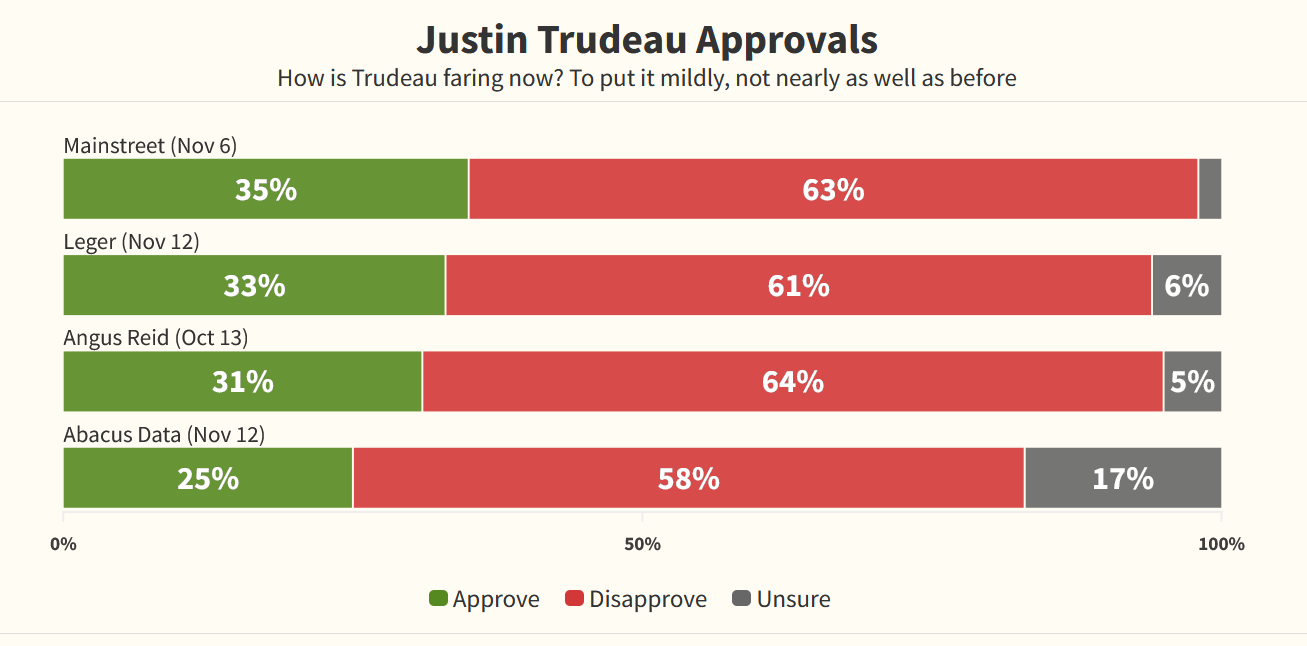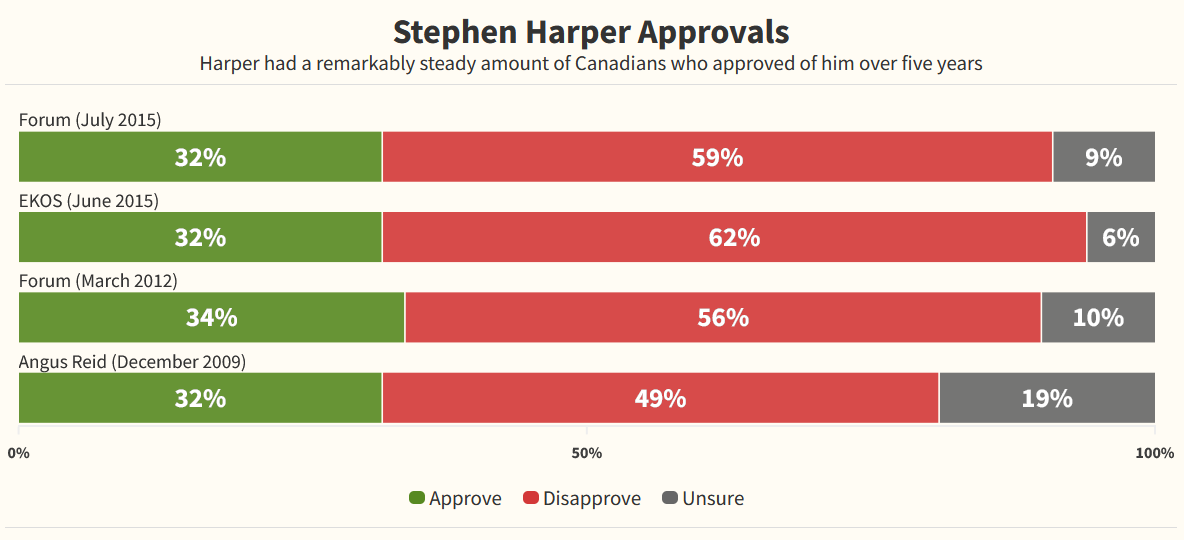Trudeau and the Ghost of Harper
Trudeau's parallels to his predecessor emerges as his popularity starts to slide.
Justin Trudeau is approaching the end of his eighth year as Prime Minister. The latest polls suggest that he’ll be lucky to hold onto power should an election happen any time soon. Luckily for the Liberals, the NDP doesn’t seem keen on pulling its support any time soon, likely enjoying their modicum of power in the minority setting.
Yet, Trudeau is becoming more unpopular as the days drag on. For a man who once enjoyed net approvals close to plus-40 in the early years of his government, it has been a drastic fall from grace.
The Start of Something New
The 2015 election was a wild ride for anyone watching. The dramatic collapse of the New Democrats and the rise of the Liberals in the latter half of the campaign signalled a shift that one, the NDP never recovered from to this day, and two, the Liberals would be launched from third place into government after the catastrophic defeat of 2011.
Following this 184-seat majority win for the Liberals, Trudeau’s popularity remained high for years.
Forum’s first poll after the 2015 election had Trudeau at 60% approval. In December 2015, an EKOS poll measured Trudeau’s approval rating at 64%. Innovative would follow with an approval of 58% in March 2016.
There was a lot of good will for Trudeau when he first entered office, and that was reflective in the vote intention, which gave the Liberals as high as a thirty-point lead at one point. But it slowly came down, and the 2019 election was a lot closer than a thirty-point lead for the Liberals.
Fast Forward to Today
Justin Trudeau’s approvals are a far cry from where they once were eight years ago. Today, his net approval fluctuates around the minus twenty mark. Clearly, many voters have soured on the Prime Minister.
Abacus Data’s latest had Trudeau’s approval at 25%, against 58% holding a negative view of him. Mainstreet has his approvals a little higher at 35% but 63% of Canadians still disapprove of him. Angus Reid suggests his approval is only 31% with 64% disapproving, and Leger has 33% approval and 61% disapproval.
With approvals like these, Trudeau can only hope — at best — for a minority government moving forward. Gone are the days that he could ever reach a majority, and whether he could even win the most seats in the House if an election were held today is dubious at best.
What’s ironic about this trajectory has been the way in which Trudeau came to power and has been slowly losing it over time compared to his predecessor, Stephen Harper.
Harper, Trudeau, There and Back Again
It will be a stroke of irony if Justin Trudeau loses the next election, and the Conservatives form the next government, simply because it’ll be a reversal of his predecessor’s rise and fall.
Trudeau entered office with a majority government and won two successive minority governments after that. Stephen Harper was the opposite as he won two minority governments first before winning his majority in 2011.
If Trudeau lasts to 2025, then they will both have had a similar amount of time in office as Harper was Prime Minister for just under a decade. In October 2025, Trudeau will also have spent nearly a decade in office and ironically would just beat out Harper.
However, just like Trudeau, Harper saw his approvals tank right before the 2015 election that swept the Liberals to power.
In a June 2015 EKOS poll, Harper had an approval rating of 32% with 62% of Canadians disapproving of him. Three years earlier, Harper had an approval of 34% and a disapproval of 56% in Forum polling.
Throughout his tenure, Harper never had the sky-high approvals that Trudeau once did, and instead had to rely on a Bloc/Liberal collapse to finally secure his Conservative majority. Poilievre may well face a similar scenario. While Poilievre’s approvals have bumped up according to some pollsters, they still remain negative as a whole. Yet, the Liberals are tanking in the vote intention and Trudeau is becoming increasingly more a liability for his party.
It may well be the case that Poilievre simply has to appear as the best of two options, even if Canadians are sour on both.
Silver Lining For The Grits?
The dramatic rise for the Conservatives and subsequent descent for the Liberals in recent polling may well be explained in a month or two. It could simply be that we’re witnessing the end of summer polling, a time when the polls tend to get a little whacky before returning to normal in the fall. That is a potential silver lining for the Liberals.
However, a miraculous turn around for the Liberals shouldn’t be expected. At this point, Trudeau and his team will need to implement major policy changes to address the issues Canadians are facing, primarily cost of living and the housing crisis. However, the Liberals have been historically moderate in their reforms and actions. Will Trudeau break that mould in an attempt to save his party? We shall see.
Could a change in leadership save the Liberals? It’s unlikely that Trudeau will hand over the reins of power to someone else, but it may be a serious option Liberal MPs need to keep in mind if Trudeau’s unpopularity keeps up. The proverbial walk in the snow, as it’s known, is always lurking.
Whatever the Liberals do, their best hope is that the economy turns, and inflation eases significantly, or else they would get stuck holding the bag in the next election.






"At this point, Trudeau and his team will need to implement major policy changes to address the issues Canadians are facing, primarily cost of living and the housing crisis. However, the Liberals have been historically moderate in their reforms and actions."
Yup. Go big or go home, and someone else is angling to bring it home right now.